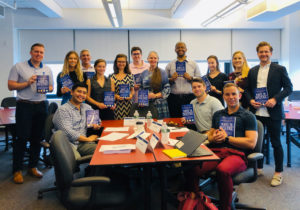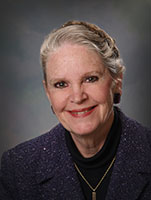A Surprising Strategic Leadership Tool
The thank you note – a powerful, strategic leadership tool to reward outstanding performance, advocate for talented people, and mold your workforce!
Published by IndustryToday.com October 7, 2019
By Carla D. Bass, Colonel, USAF (Ret) Author, award-winning book, “Write to Influence!”
“Take care of your people and they will take care of you,” my  father, also a retired Air Force colonel, sagely advised his then second lieutenant daughter. I amplify this with three principles from my book, “Write to Influence!” First, powerful writing changes lives, opening doors to opportunity. Second, powerful writing a key leadership skill. And third, powerful writing is the lifeblood of successful organizations. Each principle applies to the thank you note, especially for C-Suite executives in the manufacturing industry.It is, in fact, a strategic, leadership tool!
father, also a retired Air Force colonel, sagely advised his then second lieutenant daughter. I amplify this with three principles from my book, “Write to Influence!” First, powerful writing changes lives, opening doors to opportunity. Second, powerful writing a key leadership skill. And third, powerful writing is the lifeblood of successful organizations. Each principle applies to the thank you note, especially for C-Suite executives in the manufacturing industry.It is, in fact, a strategic, leadership tool!
This uniquely personal platform enables you to “take care of your people.” I include in this discussion letters of commendation and appreciation for they, too, are tools that express gratitude. With these documents, you can:
- Enhance careers. Beyond conveying appreciation, a well-composed thank you note provides valuable input for performance reviews, helping an individual stand out from the competition. Based on the scope and impact of the event that prompted the accolade and the signatory, it can positively influence recipient’s career for years to come.
- Mold the workforce. Leverage the thank you note to spotlight deserving individuals. Using this vehicle, you have a voice in elevating talented staff to higher levels of authority in the organization. This epitomizes the “win-win” situation; careers flourish and the organization is positioned for future success.
- Boost organizational morale. A thank you note has a ripple effect beyond the intended recipient. Word often spreads about the laudation, enhancing morale of the workforce, as well. Why? People recognize and appreciate proactive leaders, who demonstrably care about their employees. This, in turn, promulgates loyalty and continued outstanding performance. My father’s advice was spot-on!
- Set the example – Other are watching! As a junior officer, I learned from the best: Colonel James Clapper and Colonel Michael Hayden. The former retired as our nation’s Director of National Intelligence and the latter as the Director of the Central Intelligence Agency. Both were prolific in sending personal notes to their staff imparting gratitude, congratulations, and on sadder occasions, sympathy. I emulated this throughout my own 30-year career.
Whom to thank? Cast a wide net in determining whom to thank for assistance rendered or a job well done: subordinates and counterparts in your organization; community partners; people who supported your business (e.g., guest speakers, volunteers, and influencers); organizations that invited you to communicate on their platforms such as on stage presentations, podcasts, or media interviews; and companies that hired your services. In the last instance, you might send a note expressing appreciation for the vote of confidence and conclude with general ideas for the way ahead.
Strategize the approach. To whom will you address the correspondence? You might send it directly to the individual. Alternatively, you could direct it to individual’s immediate supervisor, thereby increasing visibility of that individual’s accomplishment. For especially meritorious achievements, ask someone in your supervisory chain to sign and send the extolment to his/her counterpart in the individual’s organization, with a courtesy copy to the individual and the individual’s immediate supervisor. The added gravitas of this elevated signature enhances the impact for the recipient’s performance review.
Compose a compelling product. If the action warrants a “thank you,” it deserves your focused time and thought in crafting the message. Here are four tips:
- Make it timely. Some things improve with age, e.g., fine wine, vegetable soup, and spaghetti sauce. A thank you note does not. In fact, delayed acknowledgment enervates your good intention. No note is preferable to one excessively late.
- Tailor it to the individual. Identify the level of responsibility or the level at which the accomplishment occurred. Include detail to convey the significance. Just as spices add a nuanced flavor to a meal, detail adds depth, dimension, and contour, and equips the reader with a mental yardstick.
- Explain the impact. What resulted from the individual’s action? How did it further the organization’s mission? How did it benefit others? How did you use donated funds? Why was the action meaningful? What difference did it make?
- Revise, edit, and proofread. Each step is essential and serves a different purpose. Ensure your note addresses key points and sets the context. Make each word count — avoid redundancy, expunge over-the-top emotion, and don’t write as you speak. Can you detect these flaws in the example below?
Let’s examine how these tips work with a post-event thank you:
BEFORE:
Dear Mr. Smith,
Thank you for speaking at our recent event. Based on feedback from the attendees, this event was a tremendous success. I want to express my appreciation for your contribution which contributed in a large measure to that success. Your enthusiasm was certainly contagious, and the sharing of your experiences were thought provoking and resonated with the audience. Your topic was timely and relative in the difficult challenges we face, so hearing from you was inspirational and reminded us that things are not always easy.
On behalf of our director, thank you for a memorable presentation, and for contributing to making the event a success.
Sincerely,
Jane R. Doe
Signature Block
AFTER:
Dear Mr. Smith,
Thank you for speaking at our event, Future Manufacturing Trends, on August 19, 2019. Your presentation, New Trends in Manufacturing, was timely, resonated with the audience, and contributed greatly to the event’s success, per feedback from the 250 attendees. On behalf of our director, we greatly appreciate your support and look forward to future collaboration.
Sincerely,
Jane R. Doe
Signature Block
Taken to a higher level, thank you notes can express gratitude and reward outstanding performance with submissions for formal awards or other recognition programs and advocating on behalf of talented people as they compete for selective job opportunities.

Biography: Carla D. Bass, Colonel, USAF (Ret), authored the multiple award-winning book “Write to Influence!” and conducts a variety of workshops that present writing strategies and techniques she honed for 30 years’ active duty and continues to apply with her 12 years in Office of the Director of National Intelligence. Throughout her career, she worked directly with general officers, ambassadors, congressional delegations, and foreign dignitaries. She wrote products sent to Congress and the White House; letters for executive-level signature; elevator speeches and talking points for senior officials; hundreds of personnel appraisals; and nominations for awards, congressional fellowships, and other competitive packages. In all instances, each word and every second of the reader’s time counted.
The second edition of “Write to Influence!” was published in Jun 2019 and includes new material created for her highly acclaimed workshops presented to clients: corporate, private business, government, NGOs, and the National Intelligence University. From powerful writing that banishes bureaucratic blather to crafting powerful resumes, input for personnel reviews, and essays for college applications … she covers it all — to rave reviews.
Contact Information: https://writetoinfluence.net

